M4U3词性转换复习过程
2023年高中英语语法词汇学习之词性变换规则
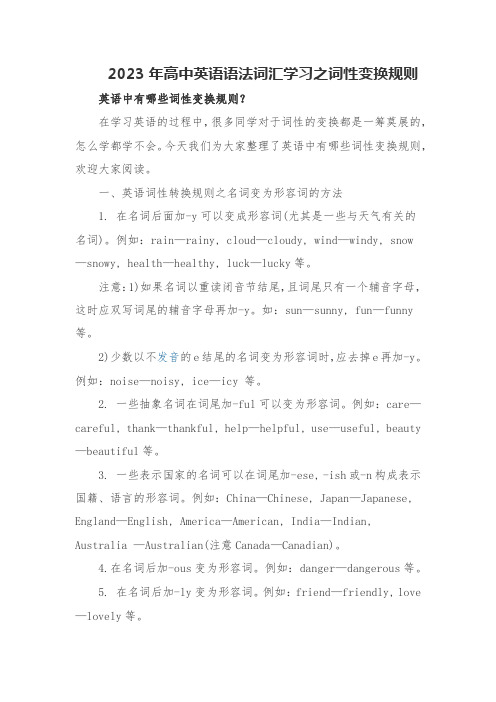
2023年高中英语语法词汇学习之词性变换规则英语中有哪些词性变换规则?在学习英语的过程中,很多同学对于词性的变换都是一筹莫展的,怎么学都学不会。
今天我们为大家整理了英语中有哪些词性变换规则,欢迎大家阅读。
一、英语词性转换规则之名词变为形容词的方法1. 在名词后面加-y可以变成形容词(尤其是一些与天气有关的名词)。
例如:rain—rainy, cloud—cloudy, wind—windy, snow —snowy, health—healthy, luck—lucky等。
注意:1)如果名词以重读闭音节结尾,且词尾只有一个辅音字母,这时应双写词尾的辅音字母再加-y。
如:sun—sunny, fun—funny 等。
2)少数以不发音的e结尾的名词变为形容词时,应去掉e再加-y。
例如:noise—noisy, ice—icy 等。
2. 一些抽象名词在词尾加-ful可以变为形容词。
例如:care—careful, thank—thankful, help—helpful, use—useful, beauty —beautiful等。
3. 一些表示国家的名词可以在词尾加-ese, -ish或-n构成表示国籍、语言的形容词。
例如:China—Chinese, Japan—Japanese, England—English, America—American, India—Indian,Australia —Australian(注意Canada—Canadian)。
4.在名词后加-ous变为形容词。
例如:danger—dangerous等。
5. 在名词后加-ly变为形容词。
例如:friend—friendly, love —lovely等。
6.在名词后加-less构成含有否定意义的形容词。
例如:care—careless(粗心的),use—useless(无用的),hope—hopeless(没希望的),home—homeless(无家可归的)等。
英语词性转换总结与归纳

英语词性转换总结与归纳在英语语言学习中,词性转换是一项重要的知识点。
通过对词性的转换,我们可以更准确地表达信息,丰富语言表达能力,提高交流效率。
本文将对英语中常见的词性转换规则进行总结和归纳,帮助读者更好地掌握这一技巧。
名词转动词英语中名词可以通过加上适当的后缀或变化形式转换成动词。
例如,“friend”(朋友)可以转换成“befriend”(交朋友),在这个过程中,名词“friend”加上前缀“be-”变成了动词“befriend”。
动词转形容词动词也可以转换成形容词,通常通过加上“-ed”或“-ing”等后缀来实现。
比如,“excite”(激动)可以转换成“excited”(激动的),其中动词“excite”加上后缀“-ed”变成了形容词“excited”。
形容词转名词形容词也可以转换成名词,通常通过加上适当的后缀来实现。
例如,“smart”(聪明)可以转换成“smartness”(聪明),其中形容词“smart”加上后缀“-ness”变成了名词“smartness”。
名词转形容词名词也可以转换成形容词,通常通过加上适当的后缀或变化形式来实现。
比如,“power”(力量)可以转换成“powerful”(有力的),其中名词“power”加上后缀“-ful”变成了形容词“powerful”。
副词转形容词副词可以转换成形容词,通常通过加上“-ly”等后缀来实现。
例如,“quickly”(快速地)可以转换成“quick”(快速的),其中副词“quickly”去掉后缀“-ly”变成了形容词“quick”。
形容词转副词形容词也可以转换成副词,通常通过加上“-ly”等后缀来实现。
比如,“quiet”(安静的)可以转换成“quietly”(安静地),其中形容词“quiet”加上后缀“-ly”变成了副词“quietly”。
通过对上述几种常见的词性转换规则的总结和归纳,读者可以更好地掌握英语中词性转换的技巧,丰富词汇,提高语言表达能力。
九年级上册英语m4u3知识点
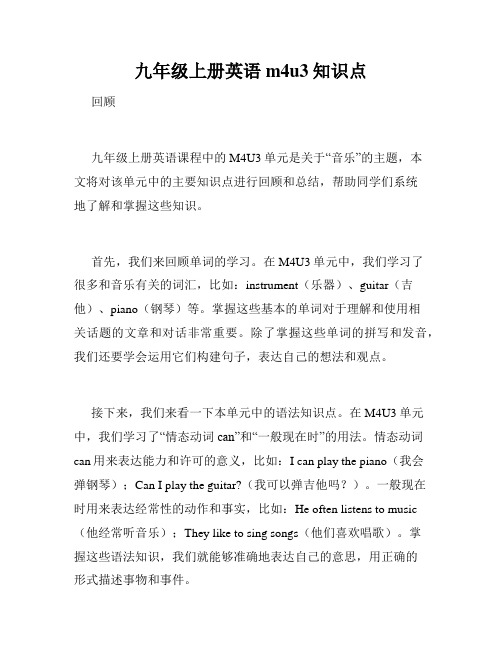
九年级上册英语m4u3知识点回顾九年级上册英语课程中的M4U3单元是关于“音乐”的主题,本文将对该单元中的主要知识点进行回顾和总结,帮助同学们系统地了解和掌握这些知识。
首先,我们来回顾单词的学习。
在M4U3单元中,我们学习了很多和音乐有关的词汇,比如:instrument(乐器)、guitar(吉他)、piano(钢琴)等。
掌握这些基本的单词对于理解和使用相关话题的文章和对话非常重要。
除了掌握这些单词的拼写和发音,我们还要学会运用它们构建句子,表达自己的想法和观点。
接下来,我们来看一下本单元中的语法知识点。
在M4U3单元中,我们学习了“情态动词can”和“一般现在时”的用法。
情态动词can用来表达能力和许可的意义,比如:I can play the piano(我会弹钢琴);Can I play the guitar?(我可以弹吉他吗?)。
一般现在时用来表达经常性的动作和事实,比如:He often listens to music (他经常听音乐);They like to sing songs(他们喜欢唱歌)。
掌握这些语法知识,我们就能够准确地表达自己的意思,用正确的形式描述事物和事件。
除了单词和语法,我们还学习了一些和音乐相关的固定搭配和表达方式。
比如,乐器的名称和演奏方法:play the guitar(弹吉他),play the piano(弹钢琴)等。
这些固定的表达方式和搭配给我们提供了更多的表达音乐和描述音乐方面的词汇和短语。
此外,我们也学习了一些关于音乐家和音乐作品的知识。
在M4U3单元中,我们了解了著名的音乐家贝多芬和舒伯特,他们的音乐作品对世界音乐历史产生了重要的影响。
通过学习这些知识,我们不仅丰富了自己的音乐常识,也培养了对音乐的欣赏和理解能力。
最后,我们也需要注意一些阅读和听力技巧。
在英语学习中,阅读和听力是非常重要的能力。
在M4U3单元中,我们通过阅读和听力练习来提高自己的理解和理解能力。
七年级下册M4U3知识点
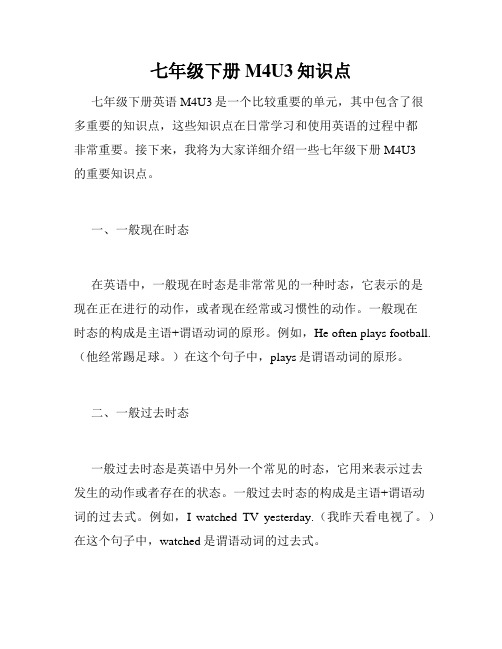
七年级下册M4U3知识点七年级下册英语M4U3是一个比较重要的单元,其中包含了很多重要的知识点,这些知识点在日常学习和使用英语的过程中都非常重要。
接下来,我将为大家详细介绍一些七年级下册M4U3的重要知识点。
一、一般现在时态在英语中,一般现在时态是非常常见的一种时态,它表示的是现在正在进行的动作,或者现在经常或习惯性的动作。
一般现在时态的构成是主语+谓语动词的原形。
例如,He often plays football.(他经常踢足球。
)在这个句子中,plays是谓语动词的原形。
二、一般过去时态一般过去时态是英语中另外一个常见的时态,它用来表示过去发生的动作或者存在的状态。
一般过去时态的构成是主语+谓语动词的过去式。
例如,I watched TV yesterday.(我昨天看电视了。
)在这个句子中,watched是谓语动词的过去式。
三、不规则动词过去式在英语中,有很多动词的过去式是不规则的,这些动词的过去式不是通过在动词后面加上-ed来构成的。
因此,我们需要特别记忆这些动词的过去式。
例如,go的过去式是went,eat的过去式是ate,drive的过去式是drove等等。
四、现在进行时态现在进行时态用来表示正在进行的动作,它的构成是be动词+动词-ing。
例如,She is watching TV.(她正在看电视。
)在这个句子中,is是be动词,watching是动词的-ing形式。
五、表示“有”和“没有”的表达方式在英语中,有很多表达“有”和“没有”的方式,这里只列举一些比较常见的表达方式。
have表示“有”,haven’t表示“没有”;There is表示“有”,There isn’t或者There’s not表示“没有”;有时候还可以用must有“必须”,can有“能够”的意思。
六、物主代词物主代词用来表示某人或某物的所有权或者所属关系,它们的使用方式不同于代词的其他形式。
例如,my表示“我的”,your表示“你的”,his表示“他的”,her表示“她的”,its表示“它的”,our表示“我们的”,their表示“他们的”。
高考英语词性转换知识点精编版

高考英语词性转换知识点精编版1.名词转动词名词转动词的方法一般有以下几种:1) 加-ing:常见的词性转换方式就是将名词加上-ing后即可转换为动词,表示正在进行的动作或状态。
例如:truth(名词,真理)→truth-ing(动词,查找真相)2) 加-ize或-ify:有些名词在转换为动词时需要添加-ize或-ify 后缀。
例如:apology(名词,道歉)→apologize(动词,道歉);beauty(名词,美丽)→beautify(动词,美化)3) 加-ize变化:有些名词转动词时直接加-ize后缀。
例如:organize(名词,组织)→organize(动词,组织)2.形容词转副词形容词转副词的方法一般有以下几种:1) 加-ly:常见的词性转换方式就是将形容词加上-ly后即可转换为副词。
例如:quick(形容词,快的)→quickly(副词,快速地)2) 不加后缀:有些形容词可以直接转换为副词,不需要添加后缀。
例如:fast(形容词,快的)→fast(副词,快速地)3.动词转名词动词转名词的方法一般有以下几种:1) 加-ing:常见的词性转换方式就是将动词加上-ing后即可转换为名词,表示该动作的状态或结果。
例如:paint(动词,绘画)→painting(名词,绘画)2) 加-er:有些动词转换为名词时需要添加-er后缀,表示该动词的展现者或从事者。
例如:teach(动词,教)→teacher(名词,教师)3) 加-ion或-ment:有些动词转换为名词时需要添加-ion或-ment后缀。
例如:inform(动词,通知)→information(名词,信息)4.形容词转名词形容词转名词的方法一般有以下几种:1) 加-ness:常见的词性转换方式就是将形容词加上-ness后即可转换为名词,表示该形容词的性质或状态。
例如:kind(形容词,友善的)→kindness(名词,友善)2) 不加后缀:有些形容词可以直接转换为名词,不需要添加后缀。
人教版必修四UNIT3.4.5单词词性转换过与短语考查(word版)-最新学习文档
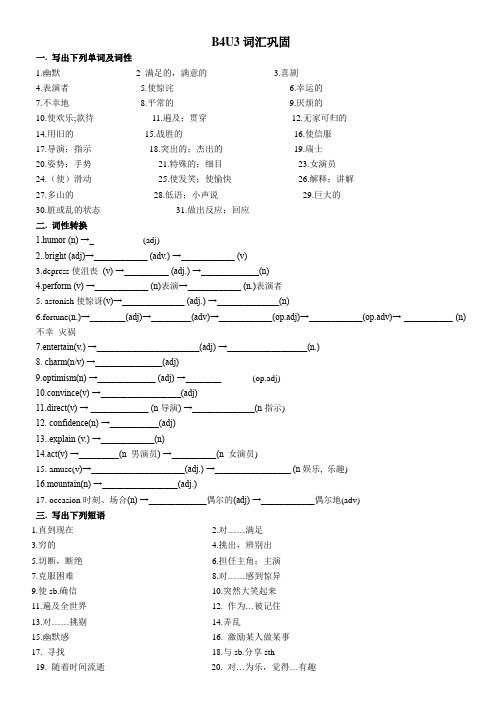
B4U3词汇巩固一. 写出下列单词及词性1.幽默_______________ 2 满足的,满意的______________3.喜剧_____________________4.表演者_____________5.使惊诧___________________6.幸运的____________________7.不幸地______________ 8.平常的___________________ 9.厌烦的______________10.使欢乐;款待_____________11.遍及;贯穿_______________ 12.无家可归的______________14.用旧的____________ 15.战胜的__________________ 16.使信服___________________17.导演;指示_____________18.突出的;杰出的______________ 19.瑞士____________________20.姿势;手势_____________21.特殊的;细目_______________ 23.女演员_______________24.(使)滑动_______________25.使发笑;使愉快_____________ 26.解释;讲解______________27.多山的_____________ 28.低语;小声说_______________ 29.巨大的_________________30.脏或乱的状态_________________31.做出反应;回应_____________________二. 词性转换1.humor (n) →____________(adj)2..bright (adj)→____________ (adv.) →____________ (v)3.depress使沮丧(v) →__________ (adj.) →_____________(n)4.perform (v) →____________ (n)表演→____________ (n.)表演者5. astonish使惊讶(v)→______________ (adj.) →______________(n)6.fortune(n.)→________(adj)→_________(adv)→____________(op.adj)→____________(op.adv)→ ___________ (n)不幸灾祸7.entertain(v.) →_______________________(adj) →__________________(n.)8. charm(n/v) →_______________(adj)9.optimism(n) →_____________ (adj) →_______________(op.adj)10.convince(v) →__________________(adj)11.direct(v) → _____________ (n导演) →______________(n指示)12. confidence(n) →___________(adj)13..explain (v.) →____________(n)14.act(v) →_________(n 男演员) →__________(n 女演员)15. amuse(v)→_____________________(adj.) →_________________ (n娱乐, 乐趣)16.mountain(n) →_________________(adj.)17. occasion时刻、场合(n) →_____________偶尔的(adj) →____________偶尔地(adv)三. 写出下列短语1.直到现在_________________2.对……满足_________________3.穷的_________________4.挑出,辨别出_________________5.切断,断绝_________________6.担任主角;主演_________________7.克服困难_________________ 8.对……感到惊异_________________9.使sb.确信_________________ 10.突然大笑起来_________________11.遍及全世界_________________ 12. 作为…被记住_________________13.对……挑剔_________________ 14.弄乱_________________15.幽默感_________________ 16. 激励某人做某事_________________17. 寻找_________________ 18.与sb.分享sth_________________19. 随着时间流逝______________ 20. 对…为乐,觉得…有趣____________一、单词中英互译并写出该词的词性1. 代表,象征___________2.. 好奇的___________3. 问候___________4. 西班牙___________5. 宿舍___________6. 意大利___________7. 食堂___________ 8. 误会,误解___________9. 主要的___________ 10. 成人_____________11. 作用,功能___________ 12. 怒气,怒火___________13. 航行,航班___________ 14.错误的,假的___________15. 口语的_____________ 16. 保护,保卫_____________17. 接近,靠近____________ 18. 社团,联系,联想____________19. crossroads____________ 20. employee_____________21. simply ___________ 22. posture ___________23. cheek ___________ 24. dash ___________25. subjective _____________ 26. frown ____________27. rank____________ 28. fist _____________29. misread____________ 30. respectful ____________二、词性转换1. state v. → ___________ n.2. represent v. → ___________ n.3. asso ciate v. → ____________ n.4. defend v. →____________ n.5. curious adj. → ___________ adv. → ___________ n.6. major v. / adj. → __________ n.→(op.)__________adj. →__________ n.7. simple adj. → __________ adv.8. Spain n.→__________ adj. / n. Italy n. →__________ adj./ n.9. employ v.→__________ n. 雇佣/ __________雇员/__________雇佣者→__________adj.失业的10. face n. / v. →________ adj. 11. anger n. →_______ adj. →________adv.12. true adj. →__________ adv. →__________ n.三、写出下列短语1. 环顾四周_______________2. 面部表情_________________3. 后退___________________4. 表达某人的情感____________5. 防卫地;戒备地__________6. 保卫……以免受____________7. 与…交流_______________ 8. 与某人分享想法____________9. 朝…点头_______________ 10. 与此相反________________11. 对….产生误解___________ 12.与…相似___________________13. 很可能…;有希望... ____________ 14. 第一个到达的人____________15. 亲吻某人的脸___________ 16.抓住某人的胳膊_____________17. 背对__________________ 18. 对…感到好奇______________19. 口语__________________ 20.书面语____________________21. 总的来说_______________ 22.舒适,快活_________________23. 丢脸__________________ 24. 避免做... ______________一. 写出下列单词或中文及词性1 秋千/摇摆____________ 2保存/保护区____________ 3前进____________4主题____________ 5 中心的____________ 6 不同的___________7漫画____________ 8无论哪一个____________ 9 消遣____________10有吸引力的事物____________ 11不管在什么地方____________ 12引擎_____________13长度_______________ 14 行动;事迹__________ 15 移民/殖民者____________16译员_____________ 17 少数/少数民族__________ 18布____________19阳光___________ 20高级的/先进的_____________ 21允许进入/入场费/承认____________22 高速公路____________ 23纪念品____________24 fantasy______________25 tourism____________26 carpenter___________27sword___________ 28 athletic__________ 29 jungle__________ 30.creature__________31 outing________ 32 shuttle__________ 33sneaker____________34 brochure__________ 35.unique__________ 36.tournment__________37.brand__________ 38.pirate__________ 39.fairy__________40.craftsman__________ 41.bald__________ 42.diver__________二.词性转换1.centre(n.) ______________(adj)2. vary(v.)____________(n)__________(adj.)3.attract(v)____________(n)____________(adj.) ___________________________(景点)4.length(n)________________(adj.)______________(v.)5.translate(v) ____________ (n人)_____________(n翻译)6.minor(adj) ______________(n) major (adj.) ______________(n)7.admit(v) _____________(n.) ___________(过去分词形式)8. advance(v) ______________(adj.) 9. tour(n)__________(n.游客)__________(n.旅游业)10. amuse(v.) ______________(adj.感到好笑的)______________(adj.令人发笑的)________________(n.)11. create (v) ______________(n创造) ______________(adj) ______________(n创造力)三. 写出下列短语1.以……而出名______________________2. 作为…而出名______________________3 难怪…____________________________4 根据…模仿;仿造_____________________5 提前_____________________________ 6接近____________________________7活跃起来__________________________ 8多种多样的________________________9尽情做某事_________________________ 10某人对..熟悉__________________________11 某物对某人来说熟悉__________________ 12在…可(容易)到达或前往以内____________。
M4U3复习讲义

M4U3复习讲义第一部分:重要单词必记1.amaze vt. 使....大为惊讶-----amazement n. 惊讶,惊愕----amazed adj. 对....感到惊讶----amazing adj. 另人惊讶的2.social adj.社会的-----society n. 社会的-----socialist 社会主义者----socialism社会主义3.presentation n. 赠送,上映,表现-----present n礼物------present v. 赠送,表示,交出4.confident adj. 有自信的,确信的----confidence n. 自信,信心5.disappointed adj. 失望的,沮丧的----disappoint vt. 使人失望,使沮丧----disappointment n. 失望,扫兴----disappointing 让人失望的,扫兴的6.convenience n. 方便,便利----convenient adj. 方便的,便利的----conveniently adv. 方便地-----inconvenience 不方便的7.secure adj. 安全的/ vt. 使....安全-----security n. 安全,防护8.injure vt.弄伤;损害----injured adj. 受伤的----injury n. 负伤,损害9.urban 城市的----rural 乡下的,农村的10.operator n. 操作者,经营者----operation n. 手术,运转----operate v 操作,起作用11.disadvantage n. 不利-----advantage n. 有利12.electric adj. 电的----electrical adj. 与电有关的,用电的----electricity n. 电,电流----electronic 电子的13.liquid 液体----gas 气体----solid 固体14.editor n. 编者,主编----edition n. 版,发行册数15.exit 出口----entrance 入口16.impression n. 印象----impressive adj. 另人印象深刻的---impress vt. 使人印象深刻17.reality n. 现实----real adj. 现实的----really 事实上18.disabled adj. 残疾的----disability n. 无能----disable vt. 使(人)残疾19.terror n 惊恐,恐惧----terrible adj. 可怕的,严重的----terrify vt. 使(人)惊恐----terrorist 恐怖分子第二部分:重要词组必记1.in reality 实际上2.all of a sudden突然3.wander around 到处转悠4.as to/as for 关于至于in regarding to 关于5.hold on to 紧紧抓住6.with the aid of 在....的帮助之下7.with the risk of 冒着.....的风险8.concentrate on 把精力集中在.....9.get the things packed 收拾行李10.express one’s views 表达某人的观点11.be of importance to 对....重要的12.end in failure 以失败告终13.put forward an argument 提出争议pared to/with与.....相比15.give out 释放出气体16.accuse sb of sth/charge sb with sth17.to one’s amazement使某人惊讶的是18.be amazed to do sth对做某事感到惊讶19.be confident of..... 对....有信心20.have confidence in .....对....有信心21.be full of confidence 充满自信22.have an advantage/edge over 胜过at a disadvantage 处于不利地位23.escape v. 逃离,脱离,被忘掉,被忽略vi. (从.....)逃离n 逃走,逃脱escape from doing sth/escape out of sth 从......逃走have a narrow escape 九死一生,幸免于难her name escape me我记不得她的名字了24.in/with terror 惊恐地terrify sb into doing吓唬某人去做某事be terrified of doing害怕.... be terrified by/at.....被....吓了一跳25.leave/have/make an impression on sb 给某人留下印象have a good impression of sb对某人有好的印象impress sb with sth使某人铭记某事be impressed by/with.... 对....有印象,为....所感动=impress sth on/upon sb 26.add to 使增加,使增强add .....to .... 把....加到....中去add up 把....加起来,合计add up to总计达,总和为....27.put forward 提出,拨快put away收拾起来,把.....留存起来put back 放回原处,拨慢put out 使熄灭,扑灭put up 张贴,建造,储备,提供食宿put aside存储,留下,放在一边,不予考虑put up with忍受,容忍put down 镇压,放下,写下put off 延期,使.....下车put on 穿上,假装,打开,拨快,上演28.carry out执行,实行,完成,实现carry on (doing sth) 继续....29.give out发出(声音,气味),分配,筋疲力尽,用完give in 屈服,让步give away 赠送,泄漏,颁发give off 发出(气味)give back归还,送回,恢复,回复give way to让步,让路于give over 移交,交出,交托give up 放弃写出give out 的意思1.This device gave out flashes of light in the fog.______________2.The teacher gave out the examination papers.________________3.After a month their food supplies gave out._________________4.Her legs gave out and she collapsed.___________________5.Noise, neighbors, that s ort of thing. I will try my best to answer them, but i can’t give out a client’s personal information.________________30.function as 担任/起.....作用,具有......功能31.for the moment 目前,暂时in a moment立刻,马上the moment一....就....for a moment片刻,一会at the moment此刻,正当那时,暂时at any moment 任何时候,马上at the last moment 在紧要时刻/最后关头Please tell Tom that i want to see her_______________she arrives.第三部分重点句型1.In my opinion, it is about time we had new computers.2.As they were wandering around, they noticed a man sitting against a tree in the distance.3.Upon hearing the news that a hurricane was coming, most of the villagers hurried to safer places.4.The recent happenings added to the pressure on the organizing committee.第四部分重要句型解剖:1.not only will he or she feel every step of climbing Mount Qomolangma, but the use will also experience the cold, smells, sights and sounds of the surrounding environment.①not only....but also..... 连接两个分句,并且not only 位于据首时,第一个分句要部分倒装。
中考英语词性转换解题技巧及易错点讲解
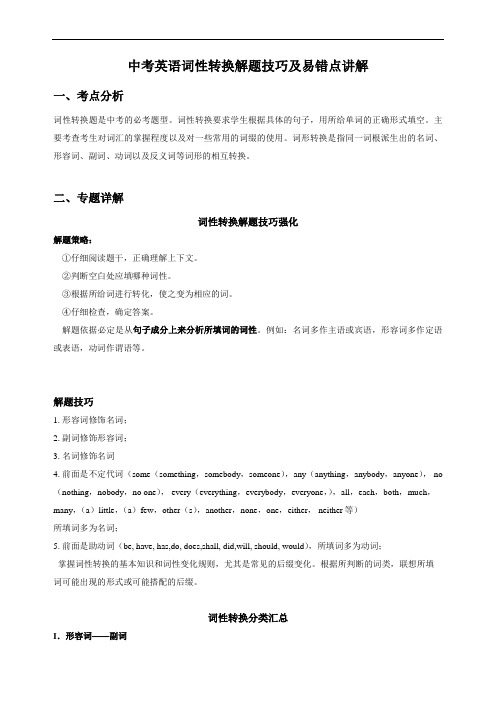
中考英语词性转换解题技巧及易错点讲解一、考点分析词性转换题是中考的必考题型。
词性转换要求学生根据具体的句子,用所给单词的正确形式填空。
主要考查考生对词汇的掌握程度以及对一些常用的词缀的使用。
词形转换是指同一词根派生出的名词、形容词、副词、动词以及反义词等词形的相互转换。
二、专题详解词性转换解题技巧强化解题策略:①仔细阅读题干,正确理解上下文。
②判断空白处应填哪种词性。
③根据所给词进行转化,使之变为相应的词。
④仔细检查,确定答案。
解题依据必定是从句子成分上来分析所填词的词性。
例如:名词多作主语或宾语,形容词多作定语或表语,动词作谓语等。
解题技巧1. 形容词修饰名词;2. 副词修饰形容词;3. 名词修饰名词4. 前面是不定代词(some(something,somebody,someone),any(anything,anybody,anyone), no (nothing,nobody,no one), every(everything,everybody,everyone,),all,each,both,much,many,(a)little,(a)few,other(s),another,none,one,either, neither等)所填词多为名词;5. 前面是助动词(be, have, has,do, does,shall, did,will, should, would),所填词多为动词;掌握词性转换的基本知识和词性变化规则,尤其是常见的后缀变化。
根据所判断的词类,联想所填词可能出现的形式或可能搭配的后缀。
词性转换分类汇总I.形容词——副词quiet安静的 quick 快速的 slow慢的 beautiful美丽的 bright明亮的 careful仔细的 certain一定clear清楚 loud大声 sad难过的 wide广泛 serious严重的 usual通常 final最后 safe安全real真的 recent最近的 main主要的 accurate精确的2、去y加ilyeasy容易的 heavy大量angry生气的 hungry饥饿的happy 快乐的 lucky幸运的3、le结尾的,去e变ypossible可能 gentle轻柔的4、不变hard难的;努力地,猛烈地 fast 快early早 late 晚enough足够 straight笔直II. 动词——名词1、加er、or、ress加erfarm 耕种—农民 drive 驾驶—驾驶员司机teach 教—老师 work 工作—工人 write 写—作家report 报道—记者 win 赢(winner)—获胜者 own 拥有—owner拥有者 paint画、粉刷---画家manage 经营—经理 record 记录—录音机加oract--actor 男演员 visit—visitor观光者 invent--inventor 发明家 calculate—calculator计算器加resswait—waitress女服务员 act—actress女演员2、加ion结尾add—add i tion 增加 collect—collection 收集 discuss—discussion讨论 decide—decision决定invent—invention发明物 invite—invitation 邀请 operate—operation手术 pollute—pollution 污染 review—revision 复习 solve—solution解答 organize—organization组织 locate—location地点suggest—suggestion建议 protect---prote ction 保护3、加ingbegin—begi nn ing开始 build—building大楼 say—saying 谚语 paint—painting 绘画meet—meeting 会议serve—service 服务 speak—speech 演讲、言语 fish—fisherman 渔夫 enter—entrance 入口know—knowledge 知识 weigh—weight 重量 please—pleasure 愉快 develop—development 发展 choose—choice选择 tour—tourist 游客die—death 死亡 succeed—success 成功fly—flight 飞行、航班 memorize—memory 记忆mix—mixture 混合物 cook—cook 厨师save—safety 安全 act—activity 活动 able—ability 能力III. 名词——名词art艺术—artist画家 science—scientist 科学家city—citizen市民 custom—customer 顾客office—officer 官员 engine—engineer工程师 friend—friendship 友谊business—businessman男商人 business—businesswoman女商人library—librarian 图书管理员 law法律—lawyer律师IV. 名词——形容词1、名词后加fulcare—careful 小心的 use—useful 有用的 help—helpful有帮助的 thank—thankful 感激的wonder—wonderful精彩的 power—powerful 强大的 harm—harmful 有害的2、名词后加ycloud—cloudy 多云的 rain—rainy 下雨的 wind—windy 有风的 snow—snowy 下雪的sun—su nn y 晴朗的 noise—noisy 吵闹的 health—healthy 健康的 fun—funny 滑稽的luck—lucky 幸运的3、名词后加lyfriend—friendly 友好的 love—lovely 可爱的 live—lively 活泼的4、形容词以al 结尾nation—national 国家的 education--educational 教育的 nature—natural 自然的tradition—traditional 传统的 medicine—medical 医药的 physics—physical 物理的chemistry—chemical 化学的 history—historical 历史的5、名词末尾的ce变成tdifference(s)—different 不同 importance—important 重要的6、名词后加enwood—wooden木制的 gold—golden金色的 (wool—woolen 羊毛的)7、名词以ness结尾kindness仁慈—kind仁慈的 illness病疾病--- ill有病的不健康的8、形容词后加ydifficult—difficulty 困难 honest—honesty诚实9、形容词后加domfree—freedom 自由 wise—wisdom 聪明10、其他danger—dangerous 危险的office—official 官方的、正式的fool傻瓜—foolish 愚蠢的west—western 西方的height高度— high高的 length长度—long 长的favour恩惠—favourite 最喜欢的 foreigner外国人—foreign 外国的 home家—homeless 无家可归的 expense费用—expensive 昂贵的 truth真相—true 真实的wound创伤—wounded 受伤的pleasure—pleasant 另人愉快的/ pleased 满意的response相应反映--- responsible 负责的有责任的electricity电—electric电的—electrical 与电有关的—electronic 电子的V. 动词——形容词interest引起兴趣—interesting 有趣的/ interested 感兴趣的excite—exciting 令人激动的/ excited激动的 freeze—freezing 寒冷的/ frozen 冷冻的frighten—frightening 令人害怕的/ frightened害怕的forget—forgetful健忘的 / unforgettable 难忘的 depend—independent 独立的有主见的like—likely很有可能发生的有希望的 realize意识到—real 真的break—broken 碎的 follow—following 下面的 fill—full 满的、饱的enjoy—enjoyable使人愉快的 change—changeable 多变的 act—active 积极的attract—attractive 吸引人的 die—dead 死的 widen拓宽—wide 宽的 live—alive活的VI. 前缀possible—impossible (polite, patient)可能—不可能 tell—retell说—复述build—rebuild 建造—重建healthy—unhealthy健康的—不健康的honest—dishonest诚实—不诚实的appear—disappear出现—消失like—dislike 喜欢—不喜欢male—female 男性—女性VII. 国名——国籍Australia—Australian America—American Canada—Canadian Britain—BritishEngland—English Italy—ItalianFrance— French Germany—German (德国人复数German s)强化练习从句子成分角度完成下列习题:1. Thanksgiving is a ______ festival in the USA and Canada. (tradition)2. There were only a few _____ from the air-crash. (survive)3. After careful ____, the committee decided to recommend Mr. Smith for the post. (consider)4. Do you agree that it is important to make yourself _____? (understand)5. I’ve lived in Chongqing for several years and I’m now used to _______hot food. (eat)6. He has to check the _____ of a difficult word before he uses it. (spell)7. The businessman lost a _______ chance to make a big fortune. (gold)9. In some parts of this city, missing a bus means ______ for another hour. (wait)10. Her early ______ gave everyone a big surprise. (arrive)11. The little girl gave an ______ wonderful performance last night. (extreme)12. The more challenging the journey is, the ______ the young people will feel. (happy)13. There has not been a favorable ______ to your plan so far. (respond)14. After they got on the bus, they found two _______. (sit)15. What we have had is just part of the truth. We should try to get ___________ information about it. (far)16. Now more and more gardens are being built in our __________. (neighbour)17. _________ speaking, the computer has become an important part of our life. (general)18. It will ______ rain this afternoon, for the sky is so dark now. (impossible)19. Many people in China are not familiar with ________ customs. (west)20.The room is so dirty that a lot of __________ can be seen running here and there. (mouse)21. It's rude to look ________ at a person. (straight)22. There is no short-cut to _________. ( succeed )23. The reporter went to the sea with several _________ to look for the lost boat. (fish)24. There are many places of ________ interest in Shanghai. (history)25. Mr. Marko is one of the __________ of that factory. (engine)26. It’s ten _________ walk from here. You needn’t take a bus. (minute)27. Jacky told us an ________ story that everybody laughed happily. (amusement)28. Thanks for _______ me. I’ll do my best. (choice)29. It’s much ___________ to swim with your friend than to swim alone. (safe)30. It was snowing _________ outside. (hard)31. How many ___________ lessons do you have every week? (physical)32. They were well ____________ at a friend’s house. (servi ce)33. The sun gives us light and ________. (hot)34. We saw her running _________ the street just now. (cross)35. I’ll do my homework more __________ next time. (care)36. In _________ to hard work, we need some good ways to succeed. (add)37. In the past punishment(惩罚)was decided by the university. The student had no ___________ but to accept it. (choose)38. A ___________ sight stopped them from going forward. (frighten)39. The visitors are ________ students. (main)40. Of all the boys, Li Ming studies ______. (hard)41. These modern machines work ____. (automatic)42. Actions speak _____ than words. (loud)43. I _________ where he comes from. (wonderful)44. We tried all sorts of __________, but they were all useless. (medical)45. Carl looks much ________ than before. (health)46. The little boy can run a marathon in __________ than three hours. (little)47. The lost calculator has been returned to its __________. (own)48. Even __________, he lost his job. (bad)49. Life today is becoming harder and busier, so everyone should have his own way of __________. (relax)50. I am fond of _________ fiction. (scientist)51. Could you tell me whether it is a ________ change or a physical change? ( chemistry )52. The students are not allowed to touch the ________ without permission. ( chemistry )53. Do you know who the telephone was________ by? (invention)54. We went to a beautiful lake and spent an _______________ day. (forget)55. What _____________ weather we are having now! (freeze)56. He tried to make more money to work out a solution to travelling _____________ (expensive)57. She _______ her face with her hands. (discover)58. Our house____________ an area of 200 square metres. (discover)59. The great_______ always teaches me how to _______ the ________ (paint)60. He is one of the most famous _________ in the university. (professional)答案:1-5 traditional;survivors;consideration;understood;eating6-10 spelling;golden;experienced;waiting;arrival;11-15 extremely;happier;response;seats;further16-20 neighborhood;Generally;possibly;western;mice21-25 straight;success;fishermen;historical;engineers;26-30 minutes';amusing;choosing;safer;hard31-35 physics;served;heat;across;carefully36-40 addition;choice;frightening;mainly;hardest41-45 automatically;louder;wonder;medicine;healthier46-50 less;owner;worse;relaxation;science51-55 chemical;invented;unforgettable;freezing55-60 expense;covered;covers;painter- paint-painting ;professor。
2024届高考英语语法填空之词性转换(四)教学设计
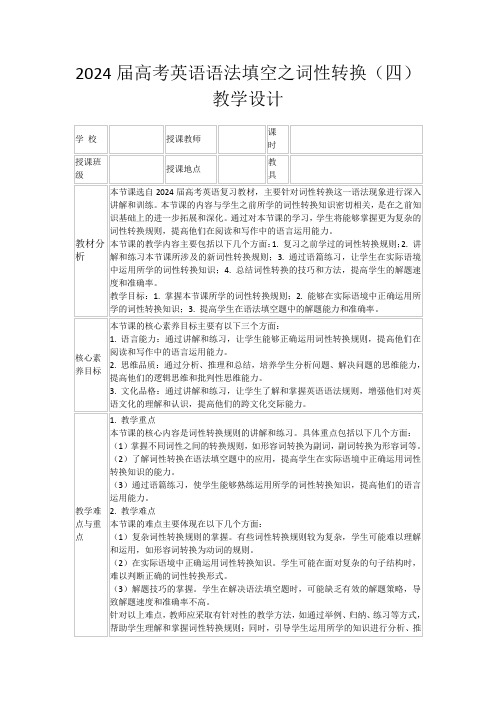
本节课的难点主要体现在以下几个方面:
(1)复杂词性转换规则的掌握。有些词性转换规则较为复杂,学生可能难以理解和运用,如形容词转换为动词的规则。
(2)在实际语境中正确运用词性转换知识。学生可能在面对复杂的句子结构时,难以判断正确的词性转换形式。
(3)解题技巧的掌握。学生在解决语法填空题时,可能缺乏有效的解题策略,导致解题速度和准确率不高。
正确答案:A. faster; faster
解析:在此句中,“faster”是形容词的比较级,表示速度更快;“fasterly”不是正确的副词形式,应为“faster”。
板书设计
1.词性转换的基本概念
①词性转换是指在句子中根据语法和语义的需要,将一个词的词性转换为另一个词性的现象。
②英语中的词性包括名词、动词、形容词、副词、介词、连词等。
2.形容词转换为副词
①形容词转换为副词时,通常在形容词后面加上-ly后缀。
②例句:She speaks very loudly and very clearly.
3.副词转换为形容词
①副词转换为形容词时,通常去掉副词后面的-ly后缀。
②例句:The movie was interesting and the acting was excellent.
选项:A. interestingly B. interesting C. interestedly D. interestinger
正确答案:B. interesting
解析:在此句中,“interesting”是形容词,用来修饰“movie”。
3.名词转换为动词
例3:根据上下文选择正确的动词形式填空:
6.形容词和副词的比较级和最高级:形容词和副词的比较级和最高级形式可以通过在词尾加上-er、-est以及加上more和most来形成,如:形容词"big"的比较级为"bigger",最高级为"biggest";副词"quickly"的比较级为"quicklier",最高级为"quickliest"。
考点20易错题型(一)词性转换-2023年中考英语一轮复习

考点20 易错题型(一)词性转换1.出题量最大,也是最难把握的方向——同词根不同词类之间的相互转换常考的相互转换词类有四种:名词、动词、形容词、副词名词→动词、形容词动词、形容词→名词动词→形容词形容词→动词形容词→副词副词→形容词做这样的转换需要平时大量的积累,建立词根词缀的概念,多掌握常用的词缀,灵活变通。
2.最基本题型,必考方向——名词、代词、数词名词考察方向:1. 复数代词考察方向:1. 宾格2. 形容词性、名词性物主代词转换3. 反身代词可能出现数词考察方向:1. 基数词、序数词的拼写与互换 2. 分数可能出现3.简单题型,多练即可把握——比较级最高级需要掌握:1. 比较级和最高级的变化方式 2. 比较级和最高级的辨识关键词4.较难题型,多次转换,反义理解有时候词类之间需要越级变换,要仔细斟酌词类间的修饰关系,确保答案的正确性。
较难题目不仅会越级变换,还需要添加反义,这需要更耐心细致地解题,分析题意。
考向一、解题技巧1.形容词修饰名词、代词性成分;部分名词也可以修饰名词。
2.动词、形容词、副词需要副词修饰,副词也可以修饰整句话。
3.系动词后一般使用形容词,连系动词后尤其需要注意添加形容词,这点易和实义动词用副词修饰混淆。
4.扎实掌握名词、代词、数词的基本知识。
5.注意做完需要通读一下,检查反义及动词的时态语态问题。
考向二、词性转换分类汇总1.动词转换为名词的常见方式1)“动词+ion”例如:pollute→ pollution, invent→ invention, discuss→ discussion, decide→ decision注意:review→ revision solve→ solution2)“动词去e+ ation”例如:invite→ invitation,organize→ organization3)“动词+er”例如: work→ worker, teach→ teacher, write→ write rspeak→ speaker, run→ runner, win→ winner4)“动词+ or"例如:invent→ inventor, act→ actor, visit→ visitor, calculate→ calculator5)“动词+ing"例如:build→ building, begin→ beginning, paint→ painting, mean→ meaning6)“动词十ment"例如:develop→ development, amuse→ amusement7)“动词十ress"例如:wait→ waitress, act→ actress8)“动词十ance"例如:appear→ appearance, perform →performance9)其他serve—service 服务speak—speech 演讲fish—fisherman 渔夫enter—entrance 入口know—knowledge 知识weigh—weight 重量please—pleasure 愉快choose—choice选择tour—tourist 游客die—death 死亡succeed—success 成功fly—flight 航班memorize—memory 记忆mix—mixture 混合物cook—cook/cooker 厨师/厨具save—safety 安全act—activity 活动able—ability 能力2.动词转换为形容词的常见方式1) “动词+ive"例如:act→ active, attract→ attractive2) “动词+ able"例如:change→ changeable, enjoy→ enjoyable3) “动词+ing"例如:excite→ exciting, follow→ following,freeze—freezing 寒冷的/ (frozen 冷冻的)4) “动词+ ed"例如:frighten→ frightened, bore→ bored5)“动词+ ful"例如:forget→ forgetful健忘的/ unforgettable/forgettable 难忘的/易忘的6) 其他:例如:depend→ independent,like→ likely,break→ broken,die→ dead,live→ alivePlease v.→ pleasure n.→ pleasant令人愉快的(指物)/ pleased 满意的(指人)w i d e n→w i d e e n r i c h→r i c h e n a b l e→a b l e3.名词转换为形容词的常见方式1)“名词+ ful"例如:care→ careful, use→ useful, power→ powerful2)”名词+ less"例如:care → careless, home→ homeless, help→ helpless3)“名词+ly"例如:friend→ friendly, love→ lovely4)“名词+y"例如:sun→ sunny, wind→ windy, health→ healthy, noise→ noisy, luck→ lucky, fun→ funny5)“名词+ing"例如:interest→ interesting6)“名词+n"例如:America→ American, Australia→ Australian7)“名词+ ern"例如:south→ southern, north→ northern8)“名词+ ous"例如:danger→ dangerous9)“名词+ en"例如:wood→ wooden, gold→ golden, wool→ woolen10)“名词+al"例如:nation→ national, education→ educational, medicine→ medical, nature→ naturalchemistry→chemical,history→historical,physics→physical,tradition→traditional11)其他例如:office→ official fool→ foolish foreigner→ foreign wound→ woundedelectricity电→electric电的→electrical与电有关的→electronic 电子的4.形容词转换为名词的常见方式1)“形容词+y"例如:difficult→ difficulty, honest→ honesty2)“形容词词尾t改成ce"例如:different→ difference, important→ importance3)“形容词+ ness"例如:ill→ illness, kind→ kindness, sad→ sadness, happy→ happiness4)“形容词+ dom"例如:free→ freedom, wise→ wisdom5)其他例如:high→ height long→ length true→ truth responsible→ responsibility5.形容词转换为副词的常见方式1)“形容词+ly“例如:quiet→ quiet careful→ carefully main→ mainly2)“形容词去y加ily“例如:easy→ easily heavy→ heavily lucky→ luckily3)“形容词le结尾的,去e变y“例如:possible→ possibly gentle→ gently terrible→ terrible4)“形容词e结尾的,去e变ly“例如:true→ truly(只有true特殊) nice→ nicely5)“形容词不变“例如:early早late 晚hard难的;努力地fast 快wide(宽的)/widely(广泛的)6.名词转换为名词的常见方式例如:art→ artist science→ scientist piano→ pianistcity→ citizen custom→ customer engine→ engineerfriend→ friendship business→ businessman law→ lawyerlibrary→ librarian music→ musician office→ officer(职员)/official(官员)7.词性转换中前缀的使用例如:possible→ im possible (polite, patient)tell→ re tell (build, write, use)healthy→ un healthy(happy, lucky, usual)honest→ dis honest (advantage)regular→ ir regular rich→ en rich (able)c o n v e n i e n t→i n c o n v e n i e n t(e x p e r i e n c e d/c o r r e c t/d i re c t/e x p e n s i v e/p l e t e)8.国名——国籍例如:Australia—Australian America—American Canada—CanadianBritain—British England—English Italy—ItalianFrance— French Germany—German (德国人复数German s)C h i n a—C h i n e s e J a p a n—J a p a n e s e K o r e a—K o r e a n1.The actor and the actress left ________ after the performance yesterday. (direct)2.Without hard work, no one can expect to ________ in doing anything great. (success)3.To be a good teacher, being patient is a ________ requirement. (base)4.About one billion people speak English as a native or ________ language. (two)5.A wide ________ of activities in the camp will attract more students this ing holidays. (various)6.There is enough ________ for people to keep valuable things in the bank. (safe)7.Jenny’s interest in drawing ________ es from her art teacher. (main)8.A good detective never makes his ________ before he has got enough proofs. (decide)9.A serious car accident ________ (happen) in this street last Sunday.10.I _________(sudden)remembered that I didn’t bring my key.11.Neither his parents nor he _________(like)lemon juice.12.The movie made _________(they)feel energetic.13.Let’s drink to the _________(friend)between us.14.Let’s see how ________ we can keep all these new words in our minds. (length)15.The boy felt ________ (disappoint) because his parents forgot his birthday.16.He’s ________ (luck) to get a chance to study abroad.17.Everyone in our school is ________ for making the school campus clean and pretty. (responsibility) 18.Download that app., and we can find a ________ of language courses open to us. (various)19.He finally ________(overe)his fear of flying and took his first flight.20.Miss Lee is the most patient and ________ (care) teacher that I have ever known.21.John was asked to give a speech in the ________(graduate)ceremony.22.A good teacher can encourage the students’ ________ (creative).23.The cartoon brings joy and ________(happy)to many children.24.Amy is a(n) ________ (usual) woman from America. She is a famous artist now.25.Poets and artists often draw their ________ (inspire) from nature.26.New ________(method)of teaching foreign languages are used in this school. 27.Hi, everyone, let’s wor k hard! The future is ________ (we).28.The students will run to the dining hall as soon as the lunch bell ________ (ring). 29.I remembered ________ (see) the movie, but I forgot its name.30.Miss Lee is an extremely ________ (care) teacher. She cares about every student.31.The old man thought to ________(he), “How lucky I am!”32.A ________ (bank) is a person who owns a bank or has an important job in a bank. 33.In hot summer days, many children feel like ________ (drink) cold water.34.The nurse was ________ (examine) her patient when the telephone rang.35.She went to Hollywood to look for ________ (famous) and wealth.36.Lily made her little brother stop ________(cry).37.He can’t make himself ________ (understand) because of his poor English.38.I think the story is _______ (believe). It may be true.39.It’s too _______ (expect). I don’t dare to believe the result.40.—I don’t like making speeches in public. It’s so _______ (embarrass).—I agree with you.41.The _______(discover)of power plays an important role in society.42.The story in the game is not ________ (believe). You don’t have to take it seriously. 43.A good beginning makes a good ________ (end).44.Few people realized the ________ (discover) was important.45.He made others feel ________ (embarrassing) by playing tricks on them.46.There are no more fish for ________ (fisherman) to catch in the river.47.We should stop using the ________ (wood)chopsticks to protect the forest. 48.All of the students should take part in ________ (keep) our school clean and tidy. 49.The wounded fish is swimming in the river. It is still ________(live).50.It was late. Ann got ________ (dress) quickly and ran to the bus stop without breakfast.51.The red wine made her feel ________ (sleep). She has gone to bed.52.Have you heard from your pen pal from the US ________(late)?53.My father and Uncle Wang have been good friends for many years, and their ________ (friend) is very strong. 54.Be ________ (thank) and happy for the gifts you received.55.We should make sure our kids have the ________ (able) to make their own decisions.56.My parents will attend my ________ (graduate) ceremony tomorrow.57.Attention, please. I have an important ________ (announce) to make.58.The young man is ________ (believe). He never tells a lie.59.She ________ (overe) all kinds of difficulties and won the Olympic gold medal.60.Their teaching methods are much better than ________ (our).61.The UK is an old ________ (Europe) country, where there are many palaces and castles.62.I don’t like loud music. It often makes me feel ________ (fortable).63.The old man has a lot of wealth, but he is always worried about ________ (lose) his money.64.I feel like ______(dance)when I listen to the music.65.I always feel nervous before the final ______(examine).66.We will insist on it until she ________ (change) her idea.67.Betty ________ (watch) television on every Friday evening.68.You’d better not go because it’s raining ________ (heavy) outside.69.We think Samuel is the most suitable person to be our monitor because he does everything very ________ (careful).70.Luckily, some people managed to run out of the ______(burn)building.71.The leader’s ______ (expected) arrival threw us into total confusion.72.In some ______ (west) countries, people go to church on weekends.73.The passengers felt lucky to be ______ (live) after the accident.74.Never forget to be ________ (thank) to the people who have helped you.75.Parents should be ________ (responsibility) for their children’s studies.76.I think a ________ (wood) chair is more fortable than a metal one.77.Don’t give up ________ (try) and you will make it in the end.78.Our team ________ (win) the school petition last week.79.The book is so interesting that I can’t stop ________ (read) it in class.80.Peter’s jacket looked just the same as Jack’s, but it cost ________ (two) as much as Jack’s.参考答案:1.directly【详解】句意:昨天表演结束后男女演员就直接离开了。
词性转换、词义辨析

主要根据词义来辨析
buy sell borrow lend
1) Kathy ______ some biscuits instead because Mr Hill had ____ all his bread. A. bought, bought C. bought, sold B. sold, sold D. sold, bought
3)当所填的词在句中为状语修饰动词,形容 )当所填的词在句中为状语修饰动词, 词或另一副词时, 词或另一副词时,需将所给的词转换成相应 的副词填入. 的副词填入.
8. It rained ______ last night and the river rose two feet. ( heavy ) ( 2005 ) 9. Li Ming is running much ______ than Wang Hai. ( slow ) 10. That man is ______ ill. Send him to the hospital at once. ( serious )
1. Last year, we went on an ______ tour to Australia. It was very interesting to learn so much about the country. ( education ) 2. Pudong is developing _______ than before. ( quick ) 3. Real _____ is more valuable than money. ( friend ) 4. I've read the book from _____ to end. ( begin ) 5. All the ______ teams sent to countries affected by tsunami have returned home. ( medicine )
高三人教版英语复习课件:词性转换 知识点讲解

词尾加 -en
例词 danger→dangerous, courage→courageous,
humour→humorous
confidence→confident, difference→different
music→musical, person→personal, nation→national, education→educational,
suitable→suitably
词尾为-ue 的形容词,去掉 e 再加-ly
true→truly
词尾为-ll 的形容词,直接加-y full→fully, dull→dully
basic→basically,
词尾为-ic 的形容词,加-ally
scientific→scientifically, specific→specifically,
(4)-ness 表示性质、状态 dark 黑的→darkness 黑暗 weak 虚弱的→weakness 虚弱 kind 友好的→kindness 善良 cold 寒冷的→coldness 冷淡;冷漠 aware 知道的;意识到的→awareness 知道;意识
(5)-th 表示结果、过程、性质、状态 warm 温暖的→warmth 温暖 true 真的→truth 真相 *deep 深的→depth 深(度) strong 强壮的→strength 力量 long 长的→length 长度 wide 宽的→width 宽度
automatic→automatically
[技巧点拨] 语法填空解题“2 策略”
1.利用句子成分确定词性 (1)如果要填的词在句中作主语、宾语或表语要考虑名词形 式。 (2)如果要填的词作定语、表语、主语补足语或宾语补足语, 要想到用形容词;如果作状语,要想到用副词。 2.根据修饰词或被修饰词确定词性 (1)如果要填的词被形容词、定冠词或形容词性物主代词修 饰,此时要考虑用名词形式。 (2)如果要填的词修饰名词,要想到用形容词;如果修饰动 词、形容词、副词或整个句子,要想到用副词。
初中英语词性转换规律总结附学习方法

初中英语词性转换规律总结附学习方法词性转换是英语学习中的重要内容之一,主要是指名词、动词、形容词和副词之间的转换。
以下是初中英语词性转换的常见规律总结:1.名词转动词:可以通过加上动词的前缀或后缀来转换。
- 加前缀:表示开始、做其中一种动作或进行其中一种活动。
例如:end(名词)→extend(动词)- 加后缀:表示把事物加上或变成其中一种状态。
例如:hope(名词)→hopeful(形容词)、lesson(名词)→ lessen(动词)2.动词转名词:可以通过加上名词的后缀来转换。
- 加后缀:表示其中一种行为、状态或事物。
例如:enjoy(动词)→ enjoyment(名词)、read(动词)→ reader(名词)3. 形容词转副词:通常在形容词后加上-ly。
- 加后缀:表示程度或方式。
例如:quick(形容词)→ quickly(副词)、careful(形容词)→ carefully(副词)4. 副词转形容词:在副词前加上very或更高级形容词。
- 加修饰词:表示强调程度。
例如:soon(副词)→very soon(形容词)、good(副词)→better(形容词)学习方法:1.多读多写:通过阅读和写作,积累词汇并学会词性之间的转换。
2.制作词性转换表格:将常见的词性转换规律整理成表格,方便记忆和查找。
3.多做练习:完成词性转换的练习题,提高应用能力。
4.注意词义变化:在词性转换过程中,要注意词义的变化,确保转换后的词语在上下文中使用正确。
总之,词性转换是一个积累和灵活运用的过程,需要多做练习,多积累常见的词性转换规律,以提高自己的语言运用能力。
高三英语一轮复习语法专题:(浙鲁京琼)词性转换(构词法)

类别
例词
直接加-ly
clear→clearly 清楚地 great→greatly 很,大大地
以辅音字母+y结尾的形容词,变 happy→happily 高兴地
y为i再加-ly
heavy→heavily 沉重地
词尾为ble/le的形容词,去掉e, terrible→terribly可怕地
再加-y
gentle→gently 轻轻地
后缀 -able
例词
accept→acceptable 可接受的 comfort→comfortable 舒适的 fashion→fashionable 时髦的 suit→suitable 合适的 reason→reasonable 有道理的;合理的
music→musical 音乐的 origin→original 最初的 -al person→personal 个人的;私人的 center→central 中央的;中心的 nature→natural 自然的;天生的
-ing
appear→appearance 出现;外貌 guide→guidance 指引;指导 perform→performance 表演;节目 exist→existence 存在;生存 prefer→preference 偏爱 refer→reference 参考;查阅
hear→hearing 听力;听觉 begin→beginning 开始
专属客服
VIP专属客服,第一时间解决你的问题。专属客服QQ版全部权益:1.海量精选书免费读2.热门好书抢先看3.独家精品资源4.VIP专属身份标识5.全站去广告6.名人书友圈7.三端同步 1.动词变名词的后缀
内有效
权有效期为1个月,发放数量由您购买的VIP类型决定。
突破高考英语语法填空之词性转换类讲义-高考英语二轮复习

突破高考英语语法填空之词性转换类考查词性的变化是高考语法填空的一个重点。
在解答语法填空中词性变化的相关题目时,一要根据空处在句中所作的成分确定词性:名词在句中常作主语、宾语、表语或定语等,动词作谓语与非谓语,形容词作表语、定语,副词作状语修饰动词、形容词、副词或整个句子;二要根据标志词及语境确定比较等级;三要根据名词前的数词、量词、冠词等修饰语以及主谓一致原则来确定名词的单复数。
【思维导图】——词性转换类宏观解题3大类型【热点考向一】提示词为名词的词性变化名词的构词规律是高考的热考点,考生备考时要注意常考词汇的变形,确保书写正确。
另外,可数名词的复数形式也是考查的重点,考生要注意可数名词复数形式的一般变形和特殊变形,确保书写正确。
【典例】限时7分钟,体会名词的词性变化1.(2022·全国甲卷)Cao believes this will make the hiking trip even more ____________(meaning).2.(2022·新高考Ⅰ卷)The GPNP’s main goal is to improve connectivity between separate ____________(population) and homes of giant pandas, and eventually achieve a desired level of population in the wild.3.(2022·新高考Ⅰ卷)“He saved my ____________ (son) life,”said Mrs. Brown.“I don’t know how to thank him.”4.(2021·全国乙卷)Provide ____________(finance) aid and other benefits for local peoples.5.(2021·新高考Ⅰ卷)The rolling sea of clouds you see once you are at the top will remind you how tiny we ____________(human) are.6.(2021·全国甲卷)Supposedly you can do it in two hours, but we stopped at the different gates and ____________(watchtower) to take pictures...7.(2021·全国乙卷)____________ (activity) there range from whale watching to hiking (远足)and accommodations aim to have a low impact on the natural environment.8.(2021·浙江1月卷)It is calculated by dividing a ____________ (person) weight in kg by their height in meters squared, and a BMI of between 19 and 25 is considered healthy.9.(2023·漳州一中模拟)By the time of his death he was the best-selling Chinese author, and over 100 million ____________ (copy) of his works have been sold worldwide.10.(2023·长春调研)From its thousands of rooms to its many beautiful artifacts (工艺品), it is one of China’s most popular tourist ____________ (destination).11.(2023·芜湖期末)Second, there exist idiomatic ____________ (method) of saying something specific in Chinese but it is extremely hard for us to put it into English properly.12.(2023·永州一模)To avoid knee pain,you can run on soft surfaces,do exercises to ____________ (strength) your leg muscles,avoid hills and get good running shoes. 13.(2023·合肥一模)These Yungang ____________(researcher) attempt is a good example of technology helping to preserve cultural heritage.【图解技巧】【解题规则】1.名词变复数若提示词是可数名词单数,分析句子成分后发现词性不需要改变,此时应考虑填名词的复数。
初中英语词性转换试讲教案

初中英语词性转换试讲教案教学目标:1. 学生能够理解英语中名词、动词、形容词和副词之间的转换关系。
2. 学生能够正确地将单词转换为相应的词性。
3. 学生能够在句子中灵活运用不同词性的单词。
教学内容:1. 名词转换为动词、形容词和副词。
2. 动词转换为名词、形容词和副词。
3. 形容词转换为名词和副词。
4. 副词转换为形容词和动词。
教学步骤:Step 1: 引入- 向学生介绍词性转换的概念,解释名词、动词、形容词和副词之间的转换关系。
- 举例说明词性转换在英语中的应用。
Step 2: 名词转换为动词、形容词和副词- 给出一些名词,如“achievement”、“advertisement”等,让学生尝试将它们转换为动词、形容词和副词。
- 引导学生通过词尾变化来确定不同的词性。
Step 3: 动词转换为名词、形容词和副词- 给出一些动词,如“achieve”、“advertise”等,让学生尝试将它们转换为名词、形容词和副词。
- 引导学生通过词尾变化和词义来确定不同的词性。
Step 4: 形容词转换为名词和副词- 给出一些形容词,如“big”、“small”等,让学生尝试将它们转换为名词和副词。
- 引导学生通过词尾变化和词义来确定不同的词性。
Step 5: 副词转换为形容词和动词- 给出一些副词,如“quickly”、“slowly”等,让学生尝试将它们转换为形容词和动词。
- 引导学生通过词尾变化和词义来确定不同的词性。
Step 6: 练习- 给学生提供一些练习题,让学生独立完成词性转换的练习。
- 引导学生通过词尾变化和词义来确定不同的词性。
Step 7: 总结- 回顾本节课的内容,强调词性转换的重要性和应用。
- 鼓励学生在日常英语学习中多练习和运用词性转换。
教学评估:1. 通过课堂练习和学生回答问题的表现来评估学生对词性转换的理解和应用能力。
2. 收集学生的练习答案,对学生的词性转换能力进行评估。
教学延伸:1. 引导学生进一步学习其他词性的转换,如介词、连词等。
高中英语单词词性转换的基本规律及练习
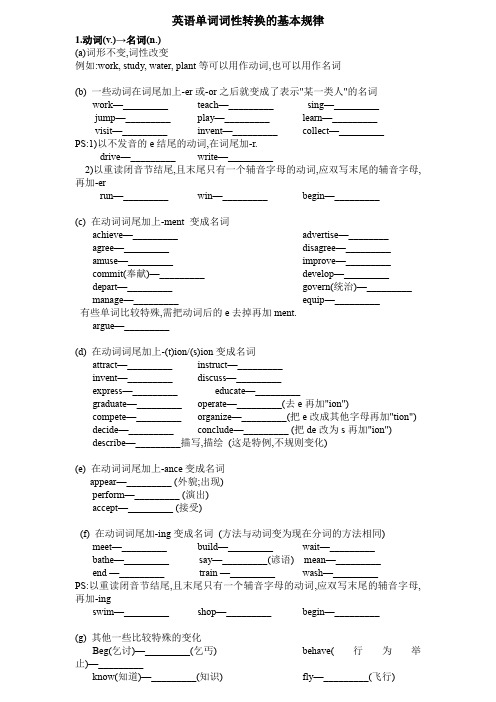
英语单词词性转换的基本规律1.动词(v.)→名词(n.)(a)词形不变,词性改变例如:work, study, water, plant等可以用作动词,也可以用作名词(b) 一些动词在词尾加上-er或-or之后就变成了表示"某一类人"的名词work—_________ teach—_________ sing—_________jump—_________ play—_________ learn—_________visit—_________ invent—_________ collect—_________PS:1)以不发音的e结尾的动词,在词尾加-r.drive—_________ write—_________2)以重读闭音节结尾,且末尾只有一个辅音字母的动词,应双写末尾的辅音字母,再加-errun—_________ win—_________ begin—_________(c) 在动词词尾加上-ment 变成名词achieve—_________ advertise—________agree—_________ disagree—_________amuse—_________ improve—_________commit(奉献)—_________ develop—_________depart—_________ govern(统治)—_________ manage—_________ equip—_________有些单词比较特殊,需把动词后的e去掉再加ment.argue—_________(d) 在动词词尾加上-(t)ion/(s)ion变成名词attract—_________ instruct—_________invent—_________ discuss—_________express—_________ educate—_________graduate—_________ operate—_________(去e再加"ion")compete—_________ organize—_________(把e改成其他字母再加"tion") decide—_________ conclude—_________ (把de改为s再加"ion")describe—_________描写,描绘(这是特例,不规则变化)(e) 在动词词尾加上-ance变成名词appear—_________ (外貌;出现)perform—_________ (演出)accept—_________ (接受)(f) 在动词词尾加-ing变成名词(方法与动词变为现在分词的方法相同)meet—_________ b uild—_________ wait—_________bathe—_________ say—_________(谚语) mean—_________end —_________ train —_________ wash—_________PS:以重读闭音节结尾,且末尾只有一个辅音字母的动词,应双写末尾的辅音字母,再加-ingswim—_________ shop—_________ begin—_________(g) 其他一些比较特殊的变化Beg(乞讨)—_________(乞丐) behave(行为举止)—_________know(知道)—_________(知识) fly—_________(飞行)heat (加热)—_________(热量) mix (混合)—_________(混合物)press(按,压)—_________(压力) sit(坐)—_________(座位) succeed—_________(成功) tour—tour(旅游)/ tourist (游客)hit (撞击)—hit( 轰动一时的人或物,碰撞)2.动词(v.)→形容词(adj.)(a) 动词后面加able,以e结尾的动词则去e加able,表示具有此性质、特点或属性.afford-_________ love-_________(b) 动词后面加ed,以e结尾的动词则直接加d,表示被动性的属性或特点.scatter-_________use-_________(注意下,这个就是我们所讲的非谓语动词作定语的情况)(c) 后面加ing,run-running,die-dying,变为现在分词形式,有的去e加ing,有的双写加ing,有的改为y加ing,规律同现在分词,表示有正在主动的进行的属性或特点。
- 1、下载文档前请自行甄别文档内容的完整性,平台不提供额外的编辑、内容补充、找答案等附加服务。
- 2、"仅部分预览"的文档,不可在线预览部分如存在完整性等问题,可反馈申请退款(可完整预览的文档不适用该条件!)。
- 3、如文档侵犯您的权益,请联系客服反馈,我们会尽快为您处理(人工客服工作时间:9:00-18:30)。
M4U3 词性转换M4U3单词及词性转换1. virtual adj.(通过计算机软件)虚拟的,模拟的;很接近的,实际上的realityn.现实,事实virtual reality虚拟世界in reality事实上;在现实中2. present vt.展示,介绍;颁发;提交,出示presentation n.展示,介绍;颁发;提交,,出示 ..... ”、,.......3. amaze vt.使惊奇,使惊诧amazement n.惊奇amazed adj.感至U惊奇的amazing adj.令人惊奇的4. passive adj.被动的active adj.主动的5. sightseeing n.观光,浏览go sightseeing去观光6. social adj.社交的,交际的;社会的society n.社会;团体;协会7. Brazilian adj.巴西的n.巴西人8. winning adj.制胜的,获胜的score the winning goal踢进关键的一球9. con fide nt adj.自信的;肯定的,有把握的be/fell con fide nt of sth/that …对 .有信心的;有把握的con fide nee n信心10. put forward 提出,提议put forward an argument提出不同意见11. disappointed adj.失望的,沮丧的be disappointed at /by对…很失望disappo inting adj.让人失望的,令人扫兴的disappo in tme nt n.失望,灰心,扫兴12. disabled adj.有残疾的丧失能力的disable v.使丧失能disability n.无能力;残疾able adj能干的unable adj.不能的enable v.使能够ability n.能力13. convenience n.方便,便禾U ;便禾U的设施或用具at one'convenience在某人、方便的时候to one' convenienee对某人方便(合适)for convenience为了方便起见convenient adj.方便的,便禾的14. secure adj.安全的;有把握的;稳固的,坚固的security n安全15. injure vt.伤害,损害get injured 受伤16. biology n.生物学biologist n.生物学家17. disadvantage n缺点;不利因素,障碍advantage n优势,优点,好处at adisadvantage 处于不禾U地位to one' disadvantage 对某人不禾U have the advantage of sb上匕某人强,占上风take advantage of sb. / sth.禾U用Word power-Grammar18. electric adj.电的,电动的electricity n.电;电流19. liquid adj. & n.液体(的)liquid soap 液体皂20. powder n.粉末;火药washing powder洗衣粉21. accuse sb of sth./doing sth控告某人某事charge sb. with sth./ doing sth.控告某人某事blame sb. for sth. / doing sth.责备某人做某事22. fade vi.逐渐消失;(使)变淡;走下坡路,衰落one' dream began to fade某人的梦想逐渐消失23. constant adj.连续发生的,不断的;恒定的constantly adv. 一24. function vi.起作用,正常运转n.作用,功能;职能function properly运转正常function as sb. / sth .起.... 作用;具有.... 功能Project p5825. pack vt.收拾(行李),装箱;包装n.纸袋,纸盒;大背包;一群,一捆,一包pack up打包;收拾get sth packed把…打包好26. exit n.出口;离去,退场vi. & vt.出去,离去,退场at the exit在出口27. escape vi. & vt.逃跑,逃离,逃脱;避免,避开;被遗忘,被忽视fireescape太平梯、安全梯;安全出口escape +n./doing逃避(做)某事escape from 从.... 逃跑,逃脱escape punishmen逃脱惩罚make onWs escape 逃跑a n arrow/ near escaped 死一生28. terror n.惊恐,恐惧in terror恐惧的terrify vt.使感到恐怖;恐吓terrify sb.into doing 吓唬某人做.... be terrified at/ with 被 ... 吓一跳29. zip vt.&vt.(使沿某方向)快速移动;拉上拉链n.拉链zip by飞速交替30. evolve vi.进化;逐渐形成evolution n.进化;进化论31. impression n.印象,感想impress vt. (使)敬佩;(使)留下深刻印象make/leave an impression on sb给某人留下印象make no impression onX寸无影响/效果impress sth. on/upon sb使某人铭记某事impress sb. with/at/by sth.某事/物给某人留下印象impressed adj.钦佩的,印象深刻的(Whatimpressed sb. most ) is ••给某人印象最深刻的是…be impressed by / with / at 被……深深打动,对……影响深刻M4U3 Words and Phrases in Word power & Grammar1.2.3.4.5.6.7.8.9.10.11.12.13.14.15.16.17.18.19.20.21.22.23.24.25.26.27.28.29.30.31.32.33.34.35.36.37.38.39.40. make a profit赚取利润make an improveme nt =improvef故出改进play an importa nt role/part in 在.. 中起重要作用set up=fo un d=establish建立end in failure以失败告终have fu n玩得快乐for fun为了好玩一see sbdoing sth. ---------- sb. be seendoing sth.(动作正在进行)see sbdo sth. ---------- sb. be seen todo sth.(看到一个过程)(类似的词还有:watch, find, observe…)get changed 换衣服get dressed 穿衣服last but not least最后但同样是重要的一take a virtual car trip to做一次虚拟的汽车旅行reduce the n eed for减少对.. 的需求be of great ben efit to =be very ben eficial to对…很有禾U( p50)be bored with=be tired of=be fed up with 对... 厌倦be puzzled by对.. 迷惑不解over time经过一段时间accuse sb of sth./do ing sth控告某人某事charge sb.with sth./ doing sth 控告某人某事blame sb. for sth. / doing sth.责备某人做某事close dow n 关闭concen trate on =focus on=fix on6s atte nti on on 全神贯注于one' dream bega n to fade某人的梦想逐渐消失make good judgeme nts作出正确判断add to使增强、使增加、使扩大add up to加起来是..... ,相当于add…to…把 .... 加到 ... 上draw con clusi on s=reach con clusi on s=arrive at con clusi on s=come to con clusi ons 得出结论send…into spac把…送上天find his computer broken 发现他的电脑坏了、”、concerning =regarding=about prep.(表示论及)关于,有关,就…而论,涉及look into the problem调查这个问题in worse con diti on 状况更差function vi.起作用,正常运转n.作用,功能;职能function properly运转正常function as sb. / sth .起.... 作用;具有 .... 功能at break在休息时间at lun chtime在午餐时间hit sb. on the heac打在某人的头上(身体部位前需用the ) out of date过时的,陈旧的、carry out a survey=make a survey展开一个调查desire for希望得至U ...................41.42. It is believed that the new products will sfiJJ well in the future.i. 表示主语的内在品质或性能的不及物动词如write, read, clea n, sell,wash, cook等常用主动形式表被动意思。
It' (about/high) time that…从句中用虚拟语气,从句的谓语动词用did或should do的形式(should不可省略)。
意为“(早)该干某事了”。
比较:It is the first/second - --time that sb. have/has done…精品资料1. It was the first/second - -time that sb. had done …。
